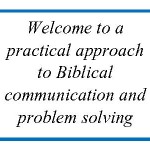Love is a complicated word to define especially the Americanized English version we employ conversationally and through writing. A trip to my dictionary was enlightening while at the same time mind-boggling in that 8 different aspects, or applications, were necessary to define love. And even these were not adequate as compared to love as defined in the Greek language of the New Testament.
I’ll be brief, but I see the following as necessary to lay a foundation for teaching the Biblical definition of all the aspects of love since 1st John 4:8 states: “He that loveth not knoweth not God; for God is love.”
Love as defined in Merriam-Webster’s Collegiate Dictionary:
- Strong affection for another arising out of kinship or personal times
- Attraction based on sexual desire felt by lovers
- Affection based on admiration, benevolence or common interests
- Warm attachment, enthusiasm, or devotion
- Unselfish loyal and benevolent concern for the good of another
- Brotherly concern for others
- A person’s adoration of God
- A score of ‘0’ as in tennis
Quite a variety you’ll have to admit.
In this dictionary the above 8 definitions are followed by a number of love hyphenated words as: love-affair, love-apple, love-bird, love-bug, love-child, love-feast, love-grass, love-handles, love-in, love-knot, love-less, love-lock, love-lorn and lovely.
All of the above connote aspects of love ranging from good and acceptable to unseemly. But sadly, all levels have been expressed in all the ranges of relationships common to mankind.
I look forward to sharing the 5 definitions of love as defined in the Greek language in the King James Version of the New Testament
Next time: The Five Ways of Loving






